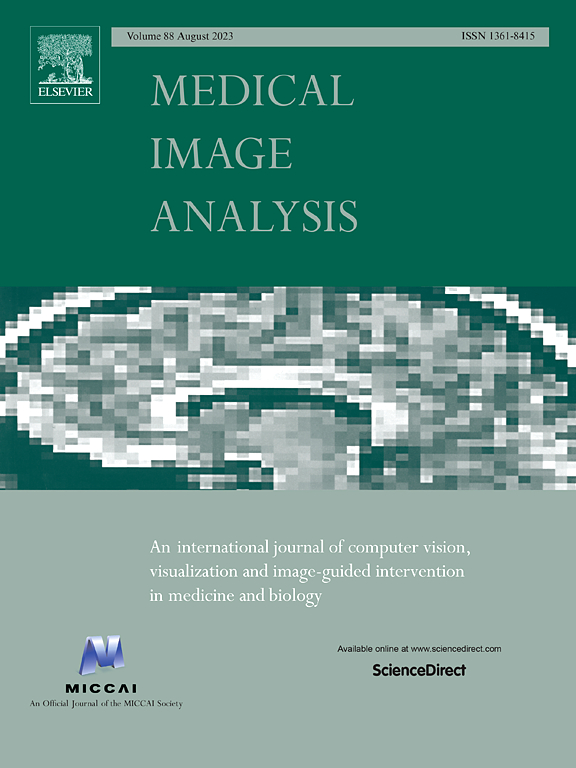通过从有偏见的委员会学习适应性协议来减轻医学数据集的偏见
IF 11.8
1区 医学
Q1 COMPUTER SCIENCE, ARTIFICIAL INTELLIGENCE
引用次数: 0
摘要
图像中的数据集偏差是医学图像中一个重要但较少探索的话题。深度学习可能容易学习到由数据集偏差引起的虚假相关性,从而导致不准确、不可靠和不公平的模型,这阻碍了它在现实世界中的临床应用。尽管具有重要意义,但在医学图像分类领域缺乏解决数据集偏差的研究。此外,偏见标签通常是不可知论的,因为识别偏见可能很费力,并且依赖于事后解释。本文提出从偏见委员会(Ada-ABC)中学习自适应协议,这是一种不依赖显式偏见标签来解决医学图像数据集偏见的去偏见框架。Ada-ABC开发了一个由多个分类器组成的偏倚委员会,该分类器采用广义交叉熵损失优化来学习数据集的偏倚。然后在偏见委员会的指导下同时训练一个去偏见模型。具体来说,去偏模型需要通过同意有偏委员会正确预测的样本和不同意有偏委员会错误预测的样本来学习与有偏委员会的自适应一致。这样,去偏模型可以在没有虚假相关的样本上学习到目标属性,同时也避免了忽略具有虚假相关的样本中的丰富信息。我们从理论上证明,当有偏模型成功捕获数据集偏差时,去偏模型可以学习目标特征。此外,我们构建了第一个医疗去偏基准,专注于处理包含七个不同偏置场景的四个数据集的虚假相关。我们的大量实验实际表明,我们提出的Ada-ABC优于竞争方法,验证了其在减轻医学图像分类数据偏差方面的有效性。代码和组织的基准数据集可以通过https://github.com/LLYXC/Ada-ABC访问。本文章由计算机程序翻译,如有差异,请以英文原文为准。
Mitigating medical dataset bias by learning adaptive agreement from a biased council
Dataset bias in images is an important yet less explored topic in medical images. Deep learning could be prone to learning spurious correlation raised by dataset bias, resulting in inaccurate, unreliable, and unfair models, which impedes its adoption in real-world clinical applications. Despite its significance, there is a dearth of research in the medical image classification domain to address dataset bias. Furthermore, the bias labels are often agnostic, as identifying biases can be laborious and depend on post-hoc interpretation. This paper proposes learning Adaptive Agreement from a Biased Council (Ada-ABC), a debiasing framework that does not rely on explicit bias labels to tackle dataset bias in medical images. Ada-ABC develops a biased council consisting of multiple classifiers optimized with generalized cross entropy loss to learn the dataset bias. A debiasing model is then simultaneously trained under the guidance of the biased council. Specifically, the debiasing model is required to learn adaptive agreement with the biased council by agreeing on the correctly predicted samples and disagreeing on the wrongly predicted samples by the biased council. In this way, the debiasing model could learn the target attribute on the samples without spurious correlations while also avoiding ignoring the rich information in samples with spurious correlations. We theoretically demonstrated that the debiasing model could learn the target features when the biased model successfully captures dataset bias. Moreover, we constructed the first medical debiasing benchmark focusing on addressing spurious correlation from four datasets containing seven different bias scenarios. Our extensive experiments practically showed that our proposed Ada-ABC outperformed competitive approaches, verifying its effectiveness in mitigating dataset bias for medical image classification. The codes and organized benchmark datasets can be accessed via https://github.com/LLYXC/Ada-ABC.
求助全文
通过发布文献求助,成功后即可免费获取论文全文。
去求助
来源期刊

Medical image analysis
工程技术-工程:生物医学
CiteScore
22.10
自引率
6.40%
发文量
309
审稿时长
6.6 months
期刊介绍:
Medical Image Analysis serves as a platform for sharing new research findings in the realm of medical and biological image analysis, with a focus on applications of computer vision, virtual reality, and robotics to biomedical imaging challenges. The journal prioritizes the publication of high-quality, original papers contributing to the fundamental science of processing, analyzing, and utilizing medical and biological images. It welcomes approaches utilizing biomedical image datasets across all spatial scales, from molecular/cellular imaging to tissue/organ imaging.
 求助内容:
求助内容: 应助结果提醒方式:
应助结果提醒方式:


